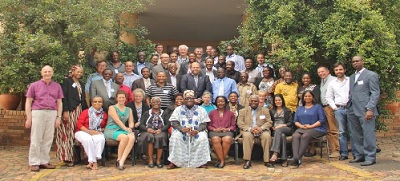Join a powerful, unprecedented alliance for better eye health for all.
Join IAPB-
Choose an alternate language here
IAPB Africa held its annual planning and review meeting in Johannesburg on 23-25 March 2015. Originally scheduled for September 2014 and then postponed due to the Ebola crisis in West Africa, this was the first meeting since key priority areas had been agreed and activities aligned with the WHO Regional Office for Africa (WHO-Afro) at a groundbreaking meeting in Brazzaville in 2013.
With participation from nine countries, a number of eye health experts, alongside a delegation from WHO-Afro, the African Platform for Human Resources for Health (AP/HRH), as well as two regional 
Despite the challenges, it was gratifying to see how the joint plan remained very much on course: four out of the five pilot countries where IAPB had invested to build national advocacy capacity and strengthen HReH, now had national plans in place; the work of the five IAPB Cadre-Specific Groups (Ophthalmology, Optometry, Allied Eye Health Professionals, PEC and Community Health Workers) on identifying core competencies was almost complete and would soon pass on to WHO for validation and recommendation to countries; WHO-Afro presented their work on new PEC practices for the management of common eye diseases and introduced the new catalogue of 26 eye health indicators, now ready to be introduced at country level.
The two-day event concluded with the unanimous consideration of how our efforts for eye health in Africa had been enriched by the strategic partnership with WHO-Afro. A mutually beneficial collaboration whereby IAPB Africa's activities gain a clear mandate and added weight, and WHO-Afro access key technical expertise and additional resources for national level roll-out. In the end, it is our common cause for eye health, which would ultimately gain from successful partnerships like this.
This message was emphasised in the final remarks offered by representatives of WHO-Afro, AP/HRH, the African Ophthalmology Council and the African Council of Optometry: all highlighting, in their own way, the importance of partnership and collective action if we are to achieve the aims of the Global Action Plan over the next 4 years.